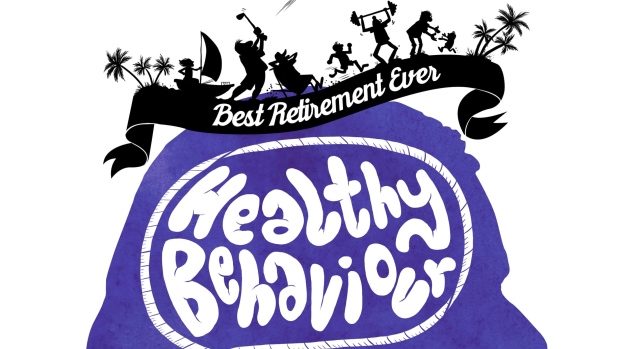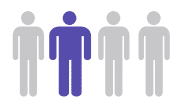Oct 3, 2018
Healthy behaviour: Fighting your waistline with your brain in retirement
Presented by:


Many Canadians nearing retirement are struggling with their weight. Obesity can cause a myriad of other health problems and limit the enjoyment of your retirement. But research has shown that to lose weight, altering your fundamental behaviour around food and retraining your brain may succeed where diets and step-counting don’t.
Recent research suggests that to lose weight or make any monumental lifestyle changes — re-training your brain may be far more effective than following low-calorie recipes or wireless step-counting devices.
In fact, according to Dr. David Macklin, Medical Director of the Weight Management and Lifestyle Program of Medcan, a private health and wellness clinic, most popular methods of losing weight won’t likely succeed on their own. That’s because, internally, our brains and bodies are preconditioned towards eating poorly. Externally, bad nutritional habits are hard to avoid because cheap, delicious and satisfying food seems to be everywhere. Both situations make it easy to gain weight to the long-term detriment to our health.
 David A. Macklin
David A. Macklin
Medical Director, Weight Management and Lifestyle Program, Medcan
Dr. Macklin is a lecturer at the University of Toronto Faculty of Medicine Department of Family and Community Medicine and a U of T trained family physician. Dr. Macklin has committed his career to the prevention and treatment of obesity; directing multidisciplinary, evidence based - behavioural weight management programs. He is the Medical Director the Weight Management Program at the Toronto Mount Sinai Hospital High Risk/ Special Pregnancy BMI unit. Dr. Macklin is on the scientific committee of the Canadian Obesity Network and has coauthored a series of online educational programs, tools and resources through MD Briefcase and international Obesity CME education programs.
The behaviour strategy is not only an important tool for those nearing or in retirement, but also for all Canadians who are facing a weight problem. Needless to say, everyone wants to have a long and active retirement but excess weight and a lack of exercise are among major contributors to chronic diseases in our senior years. It is not just vanity; slimming down and exercising may sharpen memory and boost mental health, improve mobility, help prevent type 2 diabetes, cardiovascular disease and stroke, and even some types of cancers. However, not only are one in four Canadians obese (defined as excessive fat accumulation that may impair health) but Canadians aged 55-64 are the group struggling most with the issue.1 It may seem obvious, but being healthy is a huge determinant for a happy and long retirement in your senior years and being fit should be the goal for everyone.
So, if you are feeling down about the extra pounds and the inability to keep it off, don’t be. You’re certainly not alone and it is not because of lack of willpower. Macklin characterizes Canada’s weight problem as a true, chronic, difficult, medical condition that individuals must seriously contend with, and says the obstacles that keep us overweight are real and tough to overcome. Yet behavioral changes, along with the support of medical professionals, can help people lose weight and keep it off.

What We Control and What We Don’t
One of the things Macklin emphasizes is that people should not feel guilty if they have struggled and failed to lose weight. Macklin says our bad health habits are not our fault but come about honestly because of the way we are made. When early humans populated the earth, we led a harsh, calorie-burning existence and our survival often depended on acquiring and consuming fats, sugars and salt.
But while civilization has changed, our bodies are still made for a hunter and gatherer lifestyle. We are no longer chasing food (or being chased as food!) and our muscles, which once propelled us through an arduous existence, now remain dormant in office chairs. Nutrients that were once scarce are now available in abundance in the kitchen or fast-food court. A week’s worth of fat, sugar and salt can be consumed in one sitting. Moreover, Macklin says as an evolutionary adaptation, our brains have given us a pleasant boost as payment for fulfilling survival needs — that satisfying feeling after your favorite meal. But now, our needs have morphed into cravings.
“Like a pill that we take when we have high blood pressure, lifestyle treatment is what we take when we struggle with our weight.”
- DR. DAVID MACKLIN
Yet our ingrained tendencies can be reversed and Macklin stresses the key is to develop new behaviours around food intake. He likens typical eating behaviour to Pavlov’s famous experiment with a dog and bell. Just as the dog becomes conditioned to automatically salivate when the bell sounds, we ‘think’ we are hungry at various trigger points during our day. These trigger points develop over time as we associate food, over and over again, with certain settings, such as arriving home from work or sitting in front of the TV. Eventually these settings themselves trigger the impulses or the ‘wanting.’
Managing the Appetite System
Thinking, ‘I’m starving’ when you encounter these triggers should be replaced by new behaviours, such as thinking, ‘OK, here comes my evening snack trigger moment. Time to show some restraint and focus on something else.’ Instead of overeating in front of the television, focus on the last time you ate in front of the television and recall how bad you felt. Consistently retraining your brain from unhealthy to healthy behaviours means you are on the way to giving yourself control over your food intake, research shows.
Control means not giving into triggers that historically make you overeat or going on auto-pilot and putting your hand in the cookie jar every time you walk by; controlling these impulses means that your dorsolateral prefrontal cortex, the part of the brain used for decision-making, becomes involved. Reason (hopefully) beats cravings. The more this behaviour succeeds, the easier it becomes as a person learns a new skill to confront impulses; the skill being, that if I practice restraint in this setting, I feel better.
Overeating Misconceptions
Many people would associate overeating with emotion and ‘I’m an emotional eater,’ is something Macklin often hears in his clinic, but he declares it a fallacy.
“We know that emotions are rarely, if ever, the trigger to overeating. Emotions may strengthen ‘wanting’ but emotions are not a key trigger,” Macklin says.
If someone is conditioned to eat at night, through a lifetime of associating food with the evening, it’s unlikely they’ll turn to food if it’s 10:30 in the morning and they are stressed, sad, tired or angry over a fight with the boss. If someone is stressed or sad in the evening, they may turn to food because the well-known evening impulses are strengthened by these emotions. Blaming it on the fight with the boss just justifies in our mind giving in to our impulses.
“It’s much more simple than people think,” he says.
A further misconception people have is that those who have trouble with their weight eat poorly and are drawn to high-calorie junk food. Macklin says this is a caricature and that many people he treats are healthy eaters — they just eat far too much of what they consume.
Acquiring Mental Skills and Getting Support
Research shows changing one’s behaviour around health issues means acquiring mental skills of restraint and resilience which can be used not only for weight control, but also for related health goals such as becoming more physically active, giving up or cutting back on alcohol or quitting smoking. It could also help in overcoming other negative lifestyle behaviours like excessive gambling or shopping or too much time spent in front of the TV or online.
Unfortunately there are no quick fixes. Success depends on intensive lifestyle intervention, which could involve professional support. Macklin says treatment may not only include learning the behavioural techniques but subsequent meetings with dieticians, therapists, fitness trainers that are tailored to the individual’s person needs.
“The lifestyle treatment is actually visits with the professionals. There’s a psychotherapy element to it, an impulse control element to it and a new learning or cognitive restructuring element to it. Like a pill that we take when we have high blood pressure, lifestyle treatment is what we take when we struggle with our weight,” Macklin says.
Restraint
As we have seen, Macklin says we are conditioned to overeat by triggers associated with times, places and scenarios that are constantly being reinforced; our impulses or ‘wants’ are activated by these familiar overeating settings.
He says a second automatic event then occurs. People generate ‘permission thoughts,’ automatic thoughts that persuade them to yield to these impulses and give them the green light to overeat through so-called logic and reason. Many of us are all too familiar with them: ‘I’m so stressed, it’s been a long day, I’m so tired, one of these cookies won’t kill me and I’m not on track for my plan anyway, what difference does it make? I’ll try and do better tomorrow.’
Restraint works against the impulses and these permission thoughts. Restraint means consciously eating less, and is called for when you are confronted with a conditioned impulse to overeat.
For example, considering whether to order a large steak at a restaurant — enticed by the luscious photo in a menu instead of sticking to your eating plan — should bring about this type of internal conversation; ‘I know this dinner/restaurant scenario triggers me to overeat. My work is to manage these impulses. Remember how poorly I felt last time I indulged in a large steak, I felt regretful, I felt dissatisfied and I’m not really hungry and I don’t need this and I’ll feel better if I eat the smaller steak, it’s all I need.’
“Restraint involves managing the impulses by challenging the thoughts that come automatically.”
- DR. DAVID MACKLIN
Macklin calls this ‘restraint dialogue’ as we engage the reasoning part of the brain to combat our permission thoughts.
“Restraint involves managing the impulses by challenging the thoughts that come automatically. Just looking deeper into the automatic thoughts, we see they don’t really stand up to analysis. The thoughts are not true, but unless we analyze the thoughts giving us permission, we’ll just give in to the impulse,” Macklin says.
Recruiting the reflective and thoughtful parts of our brain in a moment of wanting is difficult enough. Macklin says that it is even harder if we are stressed, tired, sad or anxious. He says this list is really important. Ailments like insomnia, untreated sleep apnea, depression, anxiety and stress can make practicing restraint even more difficult.
“These common internal states clog up our working memory, making it hard to be present in these key moments. A comprehensive and expert weight management program takes these potential obstacles into consideration, managing them if needed, to open up an individual’s potential,” he says.
Resilience
Mark Twain said, “Giving up smoking is the easiest thing in the world. I know because I’ve done it thousands of times.” Humour aside, the second part of the behavioural change is learning resilience when your plan goes awry. This is important, Macklin says, because it is virtually certain that a weight reduction plan — or any lifestyle change plan — will be associated with setbacks at some point and a person will be at risk of falling back to their old habits.
The correct response for someone who has ‘’fallen off the wagon’’ is to accept that they will have setbacks, to not be self critical and to learn and move forward.
“In the real world amongst those who lose weight and keep it off you will hear as a response to a setback, ‘What a great reminder how tough this is,’” Macklin says, “they say, ‘Let me sit with this and remember that I don’t like this feeling. I know what I can do and how much better I feel when I do it and that it works. In the next similar situation I will be ready with this excellent learning.’”
The wrong response is being self-critical or ashamed because this leads to demotivation and could lead to more overeating.
Macklin admits that although we can never hope to duplicate what our ‘reward brains’ give us in terms of instant pleasure, we can in a sense outsmart our brains in the moments that follow successful restraint, finding feelings such as success, satisfaction and hope. These positive feelings will also be combined with longer-term enjoyment, freedom from past poor nutrition and eating habits, the achievement of healthier lifestyle and all the benefits that come along with it.
“So, yes, we’ll never compete with reward behaviours: they’re too pleasurable. People say, ‘I’m not going to enjoy a salad over ice cream,’ but we say, in either case, how do you feel afterwards?” asks Macklin.
“We’ll say, find the least amount of food and drink that still allows you to enjoy your life and carve that out. Yes, you’ll have off-track days but spend as many days on track as you can.”
- DR. DAVID MACKLIN
Your Best Weight
Finding the “best weight” for yourself should be your goal instead of a standard weight for your height, target weight or goal weight. Macklin says the right weight for an individual is a healthy weight that can be maintained while still enjoying life. This takes into consideration a person’s genetics and where their highest weight was and how the body tries to ‘push back’ against weight losses.
“So we’ll say, find the least amount of food and drink that still allows you to enjoy your life and carve that out. Yes, you’ll have off-track days but spend as many days on track as you can. Start from day one and establish what you can sustain and just let your biology tell you where that lands,” says Macklin.
“By definition, that’s a lifestyle that you can sustain, and your weight loss will happen and then your weight loss will slow and slow and then it’ll stop. And then we’ll have a good sense that you’ll be able to stay at that weight because you arrived there doing something you can do.”
Dr. Macklin says that anyone who is having trouble with poor habits should first realize that their struggle is real and not a flaw in character or a lack of willpower. We are in our infancy in understanding the complexities involved in managing weight. He admits to being saddened by the lack of ethical, expert and evidence-based options for those struggling with what is a real progressive condition, and suggests anyone can begin by talking to their doctor and asking how they can learn about real lifestyle changing resources. As with other challenges in life, it is a difficult road but it helps if you enlist your doctor or other healthcare workers on your side to help you along the way and ensure your health, nutrition, fitness — and ultimately your retirement goals — can be fulfilled.









